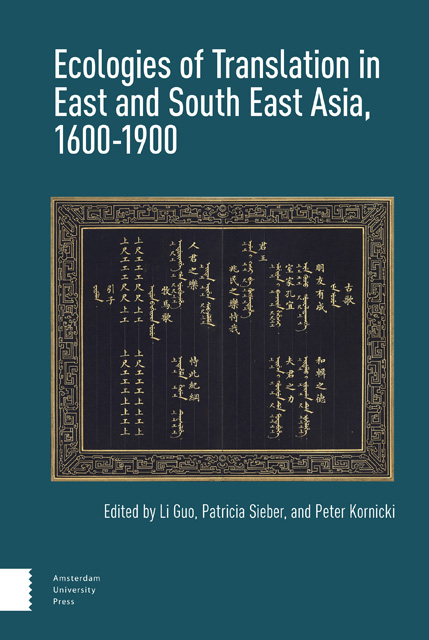Book contents
- Frontmatter
- Table of Contents
- Introduction: Scriptworlds, Vernacularization, and Shifting Translation Norms
- 1 On Not Being Shallow: Examination Essays, Songbooks, and the Translational Nature of Mixed-Register Literature in Early Modern China
- 2 A Faithful Translation: Tsūzoku sangokushi, the First Japanese Translation of Sanguozhi yanyi
- 3 Romance of the Two Kingdoms: Okajima Kanzan’s Chinese Explication of ‘The Annals of Pacification’ (Taiheiki engi)
- 4 Speaking the Sinitic: Translation and ‘Chinese Language’ in Eighteenth-Century Japan
- 5 ‘Body Borrowed, Soul Returned’: An Adaptation of a Chinese Buddhist Miracle Tale into a Vietnamese Traditional Theatrical Script
- 6 ‘Out of the Margins’: The Western Wing Glossarial Complex in Late Chosŏn and the Problem of the Literary Vernacular
- 7 Vernacular Eloquence in Fiction Glossaries of Late Chosŏn Korea
- 8 Imagined Orality: Mun Hanmyŏng’s Late Nineteenth-Century Approach to Sinitic Literacy
- 9 Linguistic Transformation and Cultural Reconstruction : Translations of Gorky’s ‘Kain and Artem’ in Japan and China
- Index
9 - Linguistic Transformation and CulturalReconstruction : Translations of Gorky’s ‘Kain andArtem’ in Japan and China
Published online by Cambridge University Press: 16 November 2022
- Frontmatter
- Table of Contents
- Introduction: Scriptworlds, Vernacularization, and Shifting Translation Norms
- 1 On Not Being Shallow: Examination Essays, Songbooks, and the Translational Nature of Mixed-Register Literature in Early Modern China
- 2 A Faithful Translation: Tsūzoku sangokushi, the First Japanese Translation of Sanguozhi yanyi
- 3 Romance of the Two Kingdoms: Okajima Kanzan’s Chinese Explication of ‘The Annals of Pacification’ (Taiheiki engi)
- 4 Speaking the Sinitic: Translation and ‘Chinese Language’ in Eighteenth-Century Japan
- 5 ‘Body Borrowed, Soul Returned’: An Adaptation of a Chinese Buddhist Miracle Tale into a Vietnamese Traditional Theatrical Script
- 6 ‘Out of the Margins’: The Western Wing Glossarial Complex in Late Chosŏn and the Problem of the Literary Vernacular
- 7 Vernacular Eloquence in Fiction Glossaries of Late Chosŏn Korea
- 8 Imagined Orality: Mun Hanmyŏng’s Late Nineteenth-Century Approach to Sinitic Literacy
- 9 Linguistic Transformation and Cultural Reconstruction : Translations of Gorky’s ‘Kain and Artem’ in Japan and China
- Index
Summary
Abstract
Language modernization in China was partly theresult of a widespread movement to translateWestern texts often via relay translations fromJapanese. In a period of cultural and politicalrevival, language reform carried specificsignificance as a manifestation of nationalrejuvenation. Amid this ongoing self-renewal, thetranslation of Russian literature was crucial tothe dynamic and dialectical linguistic negotiationbetween East and West. To illustrate thelinguistic transformation and culturalconstruction, this paper closely examinesFutabatei Shimei and Wu Tao's translations ofMaxim Gorky's short story ‘Kain and Artem’. Byjuxtaposing Chinese and Japanese translations withthe Russian original, I investigate theopportunities and challenges Chinese and Japanesetranslators faced and the different directions towhich they eventually committed themselves.
Keywords: language modernization,Russia, Japan, China, translation
In the early period of the Russo-Sino-Japanesetriangular relationship, language transformation wasone of the pivotal effects to emerge from theintroduction of Russian literature into East Asia.As Karen Thornber points out, ‘The many versions ofbaihua (the newwritten vernacular) that proliferated in China inthe 1920s were hybrids not only of classicalChinese, the premodern vernacular, and contemporarycolloquial speech but also of Japanese and westernsyntactical structures.’ Most scholarly discussionof language reform in China has focused on thenegotiation between China and Western Europeanlanguages; however, new insights can arise when weturn to the often-overlooked role of the Russianlanguage in East Asian language reform.
The translation of Russian texts was one of theearliest and most crucial ways that Japanese andChinese writers engaged with the Western world. Theintroduction of Russian literature into East Asiatested the ability of Japanese and Chinesetranslators to work at the limits of their ownlanguages’ intelligibility. Many aspects of theRussian language could not readily be translatedinto Japanese or Chinese; meanwhile, those languageshad developed an integrated system ofself-presentation, honed over thousands of years ofpractice, which made it less amenable to abruptcultural change. On the other hand, though, theattempts to reconcile them led to literaryinnovation in both Japanese and Chinese.
- Type
- Chapter
- Information
- Ecologies of Translation in East and South East Asia, 1600-1900 , pp. 293 - 316Publisher: Amsterdam University PressPrint publication year: 2022



